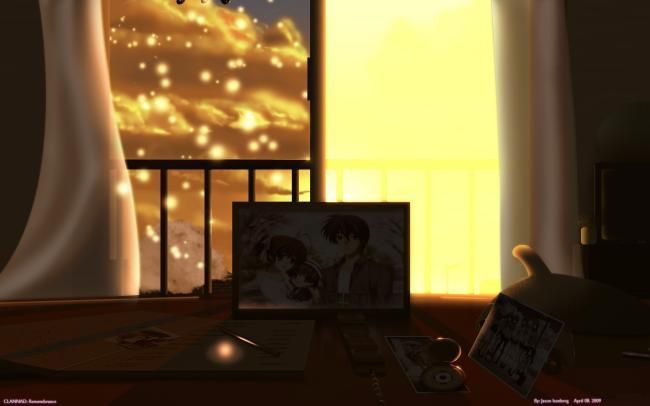
I am at this point very hopelessly behind on seasonal anime (So no brainmarks this season either, oh sorrow). However, I did recently complete a full rewatch of Clannad After Story (having splurged massively to obtain it in glorious 1080p), so perhaps it’s time I delved once more into that show of shows and talked about the things that stood out to me while being glued to the screen.
Almost any show, or any kind of storytelling medium for that matter, subconsciously projects a set of ideas onto the viewer: a model of the world, an ethical code of sorts. The kinds of things the protagonist strives for, the things he/she overcomes, the sources of conflict, converge into an interpretation of reality, a “this is how the world is like”. And of course, the reason I begin with this is because I feel like this is particularly important and noticeable in Clannad. With Clannad the ideas are woven into the story with a regularity and prominence that make it almost conscious, and at the end of the day the kind of world that Clannad painted onto its canvas of vivid colors and poignant music is, for me, perhaps the main reason it is so resonant, so beautiful and heartfelt.
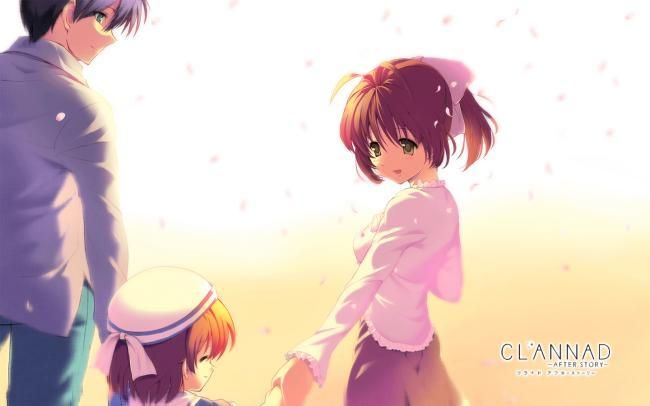
So here’s a prominent recurring idea in Clannad: People First. People are what truly matter in Clannad’s universe. This idea is made evident along several threads. For one, Clannad’s long story is peppered with various pursuits, including impassioned ones like Akio’s acting career, Yoshino’s musical stint, Kotomi’s parents’ research, and while Clannad does not demonify these by any means, it does, virtually every time, gently steer the focus back onto people. In fact it often goes so far as to infuse these pursuits with an aura of almost sanctified importance, stressing the meaning these pursuits held for their pursuers – the raw living, breathing happiness it earns, and pivots on that to show what it truly means to care about another person. And it blesses that act of caring, weighing it against the sacrifices and pronouncing it worthy, because in the end, in Clannad’s valuation, it is the people we love that truly matters. From the original Clannad down through After Story many of the interweaving storylines in the show follow this in a recurring pattern. Akio and Sanae gave up their career dreams for the happiness of their daughter, Tomoya’s father gave up his happiness and honor for a son whose understanding almost never surfaced, Yoshino came home in the wake of his shattered musical journey to rediscover meaning in the form of Kouko, and Kotomi’s parents, at the very end, chose to preserve a final gesture of love for their daughter over the culmination of their life’s work.
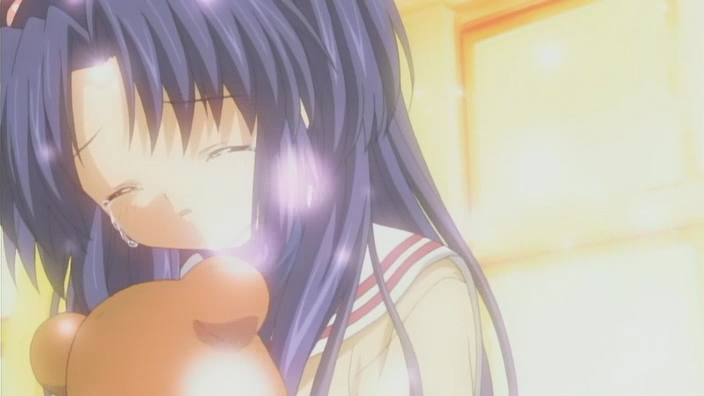
But people isn’t just a life goal – an external manifestation of purpose. Clannad’s portrayal of human relationships is so intimate and earnest that it feels like the people blend together and each become part of the others’ whole. People complete people. The strongest example of this is Tomoya and Nagisa, all along the winding journey of their entwined lives from episode 1 through the fifty episodes that followed. If there was one word that could summarize Tomoya and Nagisa at the very beginning of the show, when they first met amidst the cherry blossoms, it would probably be incomplete. And in retrospect the portrayal seems intentional: both of them were sort of stuck in a rut, harboring hidden strengths while helplessly ecking by against personal hurdles they couldn’t be rid of. It was Tomoya’s physical strength and natural wit that first began making a difference when he began finding himself helping people because he could, and under the protection and encouragement of Tomoya’s care Nagisa was able to gingerly step out of her timid insecurity and gradually tap her natural wellspring of unrelenting wisdom and gentle strength, and as Nagisa matured, she in turn put into Tomoya’s uncaring worldview something truly beautiful and precious, something Tomoya could want to love and protect, someone who could also love and protect him, and thus empower him towards adulthood with purpose and hope. The characters feel almost like jigsaw pieces, and the closer they become the more they fit into each other and the more complete each becomes. Tomoya is Tomoya because Nagisa is Nagisa.
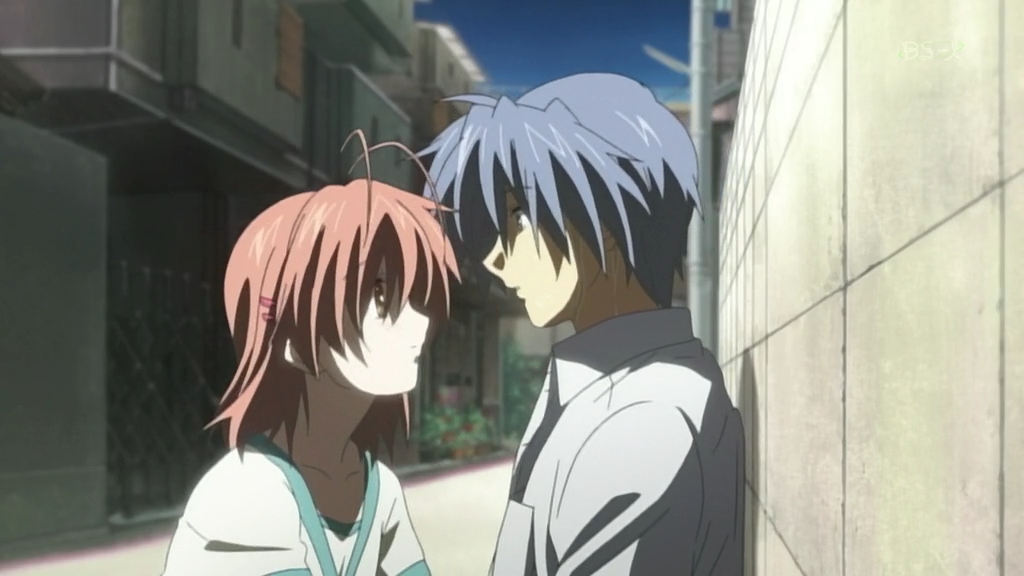
The significance of this is that this is really Clannad’s interpretation of human relationships. Family and friendship isn’t just a matter of obligation or responsibility or even love or kindness, but also self seeking. Through the sum of others you find yourself, and partially through you do others find themselves. In Clannad’s storytelling, the act of helping other people also feels exceedingly.. natural – if one had the need and the other had the means – you help that person. There is no concept of deserving or fairness about it, in fact Clannad reduces the act of helping to just another human interaction, and the effect is mutual. When Tomoya helped all those people during his school years, he wasn’t just giving things away for free. He was intertwining himself into the lives of other people, people who became dear, and who go on to define the rest of his life in exceedingly powerful ways. The ability to help isn’t a privilege that you guard carefully and execute selectively, it is a means of connecting with humanity and building your life that should be used as often as possible. Clannad establishes human beings as irrevocably social creatures, and thus justifies the earnestness with which its characters interacted, loved, suffered and reveled in each other. This is how you live. This is what it means to live.

As Tomoya finally began to come to grips with Nagisa’s death, the “People completes People” idea is brought vividly to focus as Kyoani flashed the bits and pieces and the sights and sounds of Nagisa’s life across the screen. Tomoya stopped running away, and as he turned back to find himself he rediscovers the entirety of Nagisa’s imprint upon his soul. When Tomoya finally brought Ushio home to visit his father, it almost felt like Nagisa has at long last completed a circle in Tomoya’s being, even though she was no longer physically there. It was Clannad’s spin on the traditional “she lives on within him”. In fact Tomoya’s final redemption felt like the completing of many circles, small and large, from all the people he had interacted with, whom he had helped, and who had helped him, and through whom all he was able to at last understand himself and know his way forward. The Tomoya that found happiness and catharsis was Tomoya plus the sum of significant people in his life. There is little concept of destiny or calling or fate in Clannad’s universe – it is all people. Tomoya’s life was people. A possible interpretation of the ending, of Tomoya’s decision that he wanted to meet Nagisa knowing all that must come to pass, could be as thus: it isn’t about what happens in the end, everything that has happened throughout his time with Nagisa and Ushio didn’t become pointless because both eventually died. Tomoya was who he was because of his life spent with his wife and daughter. He lived and felt happiness, and that living was worth it. Better to have lived and laughed and suffered and lost than to have never truly lived before. For a life without the people important to it wasn’t true living in Clannad’s valuation.
Incidentally, if that sounded like something Yoshino would say, that’s probably no accident. Yoshino is an interesting character. I feel like he is to Clannad something like what Akari is to Aria – possibly the person most connected to the core ideas of the show, yet lacking the social tact to avoid sounding embarassingly funny. But listen to the stuff this man says. He puts it in the most straightforward, cheesiest of ways, but he knows what is going on.
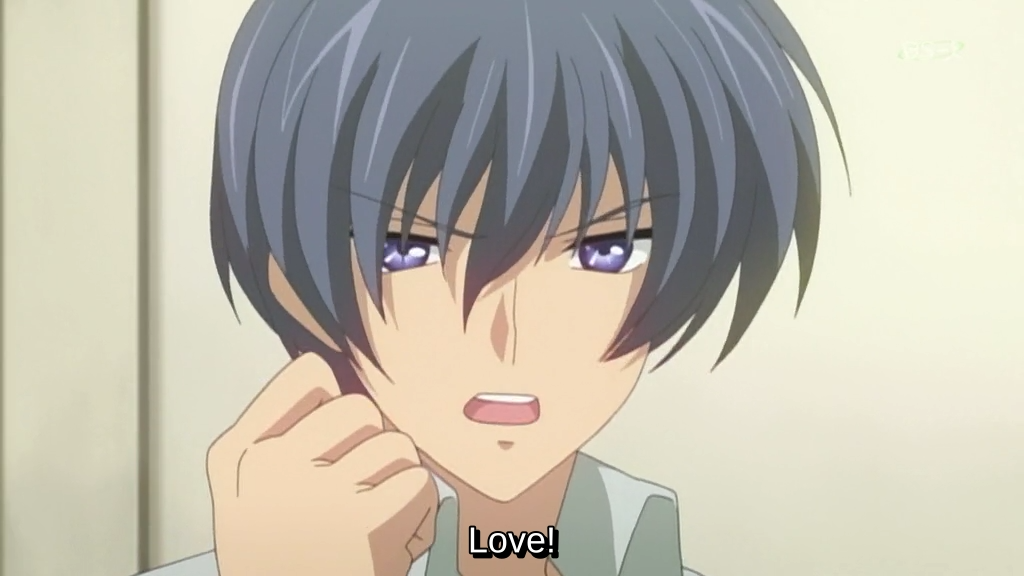
Clannad goes so far as to underscore “People over World” by portraying an unfeeling and cruel world behind the characters. In contrast with, for example, Air, which hints at a trace of kindness in the way fate worked, Clannad’s world killed Kotomi’s parents, killed Yukinee’s brother, killed Nagisa, and then killed Ushio right when Tomoya had finally reconciled with her – all for no apparent reason. As I mentioned in a previous post, I think this has something to do with Clannad’s model of the world: it is unreasonable. There is no reason to tragedy. With this Clannad sets up a sort of “people versus world” model of reality, where there is no greater world order and tragedies happen just because, and where people close ranks alongside people, and create their own joy, their own meaning, and their own miracles. Unsurprisingly, people lie at the heart of virtually every positive development in Clannad. Even the floating lights that brought about the final miracle – the “true end” – are wrought of people helping people to achieve happiness. And underneath all this is a principle of sorts, something that I call Clannad’s “Philosophy of Doing“.
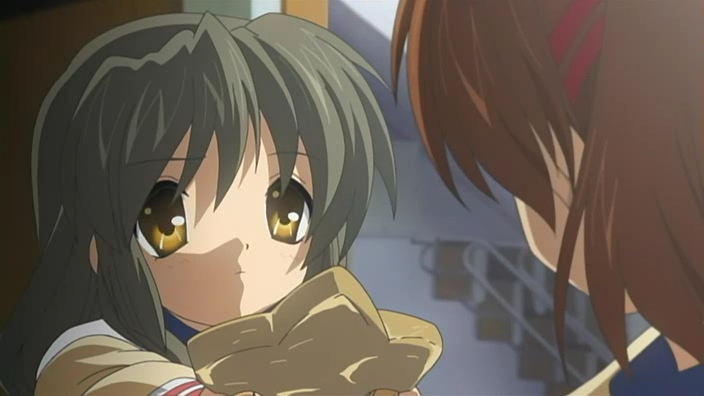
Interestingly enough, “just jump in and do something” is also something of a recurring theme in Clannad. Whenever confronted with a difficult situation, the characters invariably find themselves something to do – some more calculated and sensible than the others – and then sets about it in earnest. An early example is Fuko’s starfish distributing. As many people probably legitimately complained, making and distributing starfish is kind of a dumb and random thing to do and to get worked up over, but it’s hardly the last random thing onto which our characters pounce. When Kotomi shut herself in and refused outside contact, Tomoya decided that he was going to spend days and days cleaning out her yard. When Mei was worried about Sunohara, she decided to beg and do everything she could to get the soccer team to let her brother play again – when her brother showed no sign of wanting to do so – with Tomoya and Nagisa in tow. And in Mei’s case, it didn’t even really work out, and yet the happy end for her arc did come as almost an endorsement of her actions. Clannad seems to be advocating this: whenever someone you care about is in trouble and neither you nor him/her seem to be able to sort it out, well, do something anyway. Find something you can do, and do it. And in light of all the above discussion, there may be some sense to this. In fact the way it often works in real life is that you often don’t know if something you’re doing will work out, and dedicated efforts sometimes lead to nothing whereas sometimes something offhand and random, or even unintentional, ends up making a big difference. So the idea is not to hold back on doing something just because you don’t think that it’ll work, because you never know when something you do could make a world of difference to another person. So do something – anything – whenever you have the chance. Even if you do a million useless things and then do one thing that mattered, that one thing would be worth it. My favorite example of that one thing is when Mitsui, having rudely turned down Fuko’s starfish offer once, walks up to her again, said she would try to attend the wedding, and told her to do her best. That obviously meant the world to Fuko. In Clannad’s model of the world people have only other people to count on for support, and so there could be a time when the difference between someone being able to move on and find fulfillment could hinge on a simple action you could choose or choose not to do. So always choose to do. Never hang back.

And with that we come full circle: People matter. People define who we are. People are their own sources of inspiration and joy. And so go forth and do things, do things for people. And in the multitude of all things done for people some will strike home and create a miracle, a trace of wonder in an unfeeling world. Notice the way Clannad portrays this: when something strikes home and happiness is achieved, that’s an orb of light, a small miracle. And the sum of a sufficient number of orbs of light converge to create a great miracle. Great change is possible if and when sufficient people move to make their small changes. It is an empowering philosophy, one that emphasizes the capabilities of humanity over the other uncontrollable currents of our world. It tells us to move, and to care, because it is not meaningless, and because it can change things. Fate or destiny doesn’t come into this. We are responsible for the quality of our lives, the happiness and fulfillment of those who depend on us and those on whom we depend, and the sum of happiness in our world.

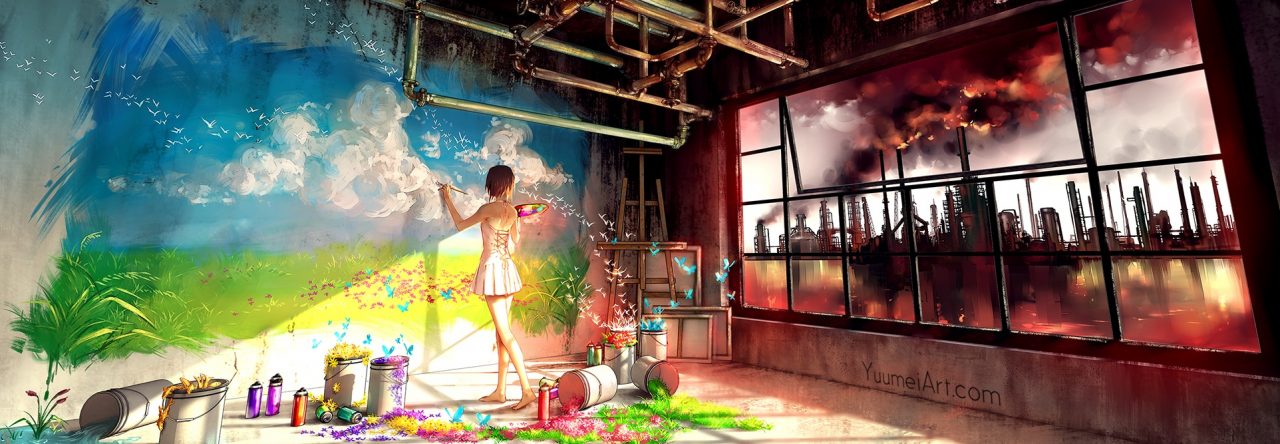
a
Bravo. That was a very insightful.
Jason "moofang"
Thank you :)
Bob Bobertson
This was pretty fantastic, I’ve never really seen this far into the actual “core” of an anime before and I think that this was definitely a worthwhile and very insightful read, the “Philosophy of Doing” was especially interesting which was rather surprising as such things are usually a bit out of my field of interest… or I’m just ignorant. >.>
Maybe this’ll give me the nudge I need to finally watch Clannad and it’s After Story. I guess I’ve been reluctant as even Nagisa’s theme pulls at my heart strings.
Jason "moofang"
Oh my goodness! I really really appreciate you reading all of my post and your complements, but it is absolutely criminal for you to be so spoiled on what happens before you’ve actually watched the show!
Well, spoilers or no spoilers I think it’s still worth watching. Clannad and the early parts of After Story can get a little hit-and-miss, but the later parts of After Story is some of the most evocative storytelling I’ve ever experienced in any medium. I very highly recommend it :)
Victor
Hey man that was probably the best description and analysis of Clannad that I’ve ever read. I read through entire thing and it was just beautiful. After watching the series twice over the past two years, being able to read something like this brings back memories of Clannad. I even watched Kanon and that was great too. The thing is, Clannad truly did change me the first time I watched it. When I saw Tomoya, I saw myself in him. I could relate to him and sympathize with him and all of his struggles. I was 16 the first time I watched it, and by god did that Anime increasing my loathing for something in this world worth fighting for. I was at a tough time in my life too. I had no friends, no job, struggling in school, never had a girlfriend. 2 years later im working at tops, have great grades, and flirting with and getting to know girls all the time. I stil hVent been able to commit to a relationship with anyone and I still haven’t developed any friends that I hang out with on a regular basis, but I’m happy enough knowing right now that I have a job. The point I’m trying to make is that, you’re right,
People do need people. And I have my family. Without them I would be lost, but I’m starting to know that I’m going to need to develop external relationships with other people as well if I want to continue to grow as a human being. Seeing an Anime like Clannad really clears things up for me, especially with an analysis like this one. Thank you for posting this. You’ve helped and inspired me in more ways than you know
Jason "moofang"
And thank you for your comment and for reading the post :) I hope you find (and create) happiness for yourself and for the people important to you.
shirayuki75
I just had a brief CLANNAD phase today and stumbled upon this post. This is brilliant, and really makes me reconsider the entirety of CLANNAD (esp. that ending), as I have only watched it once. It helps that “The Palm of a Tiny Hand” is playing in the background.
I’m taking AP Literature right now, and although all of our discussions are interesting, nothing would make me happier than to see anime become a fuel for educated and analytic discussion, much like this post . Special gems like CLANNAD exist out there with so much to say about humanity.
Jason "moofang"
Thanks for reading :)
Shiranai
Incredible analysis!! If I had a magazine or something I would immediately hire you (with a high salary) haha xD.
Yeah, Clannad has so many things to teach. So many abstract and deep meanings. It was a great art.
If you don’t mind, can you describe to me your interpretation of the true ending? I mean to explain what you think happened in the very. How and why did Ushio was in the Illusionary World etc. Because I’ve read many theories but judging from this post yours will be beautiful :p
Jason "moofang"
I’m afraid I’ll have to disappoint you there: I don’t have a solid theory on the literal happenings in the ending. I think the anime isn’t terribly clear with things, and I’m only halfway through the VN (which is very very long). All the same I generally prefer to – and am probably better at – thinking figuratively rather than literally. Ie rather than figuring out what cosmic rules in clannad’s universe actually enabled the events of the True End, I like to think more about the ideas and worldviews embodied, the results of which I think I have elucidated in the post. The Internet tends to be better at doing the other one :P Well if I finish the VN and think I have something interesting to say I’ll try and make sure I post it ^^
Thanks for reading and commenting!
Shiranai
Oh, I understand. I do the same and that’s why I ended up not being sure about what enabled those miracles.
Frank
Hey, sorry to post on a relatively dead thread, but first lemme say, this analysis is amazing. Clannad is tied as my favorite story of all time (tied with Kanon, which I’m slightly more partial to, mainly due to the setting and atmosphere). Anyway, I think I understand the ending. So when Nagisa was dying and Akio took her to the clearing, he wished for her to get better and the wish was granted. She was then bound to the town, causing her to get sick every winter when the town was at it’s weakest, and sicker as it was being developed and torn apart. Tomoya helped many people achieve true happiness, thus granting him the light orbs shown in Misae and Miazawa’s arcs. These were then transported to the illusionary world, one of the tangent universes Kotomi’s parents were studying, which was created by Ushio. I say it was created by Ushio, because she was the only living being in it for a very long time, and Kotomi states that the other worlds and our own can directly affect each other. After Ushio died, Tomoya ended up there (though it is unclear if he was immediately transported there or if he had to die first). The world defies normal-world conventions of time. Because of this, Tomoya doesn’t end up there until after Ushio’s death, but both he and Nagisa possess memory of it before they are even dating, due to their connection to it. Think of this as similar to Angel Beats where Otonashi has to have died before Kanade in order for Kanade to recieve his heart, yet she reached the afterlife before him. I think it safe to assume this type of non-linear most-mortem time is exists in both universes seeing as Angel Beats and Clannad were both made by KyoAni and Key, and all other Kyoto/Key works exist in the same universe (as shown by Misuzu’s weird juice all over Clannad, and Akiko’s jam in after story. Nagisa and Nayuki are close enough in age to be friends, as at the start of Clannad Nagisa is 19 and Nayuki would be 21-22 as Kanon takes place in 1999 and Clannad takes begins in 2003). Anyway, Tomoya uses all the light orbs he gathered in our world to go back to the day that he met Nagisa, so he can right his wrong and never meet her. He realizes that he never truly wanted that, and neither did Nagisa, so the wish never happened. As a way of repaying Tomoya for his endless strength through enough hardship to break any normal person, the town grants him the happiness he earned by severing the tie between itself and Nagisa and Ushio’s sickness (although there’s no doubt in my mind that they are still connected to the town). Finally, everyone was truly at peace. This is of course if you want to look at the town as a living entity.
Frank
Oh sorry for all the grammar mistakes, it’s 1 am. Anyway that’s just my interpretation of the events. Again, great article, it was an amazing read. Just wondering, have you watched Kanon?
Jason "moofang"
Hey, thanks for posting your interpretation! My thought is that although your explanation makes sense in terms of progression (what happens which causes what etc), it doesn’t seem compelling – or at least complete – in a storytelling sense. A good talking point is the idea that Nagisa’s person was bound to the “place”, which is something I also think is strongly hinted in the show but that is conspicuously missing in my analysis because I wasn’t able to make a lot of sense of it. A lot of questions follow from this “place” idea. Like _what_ is this place? Why is it somehow magical in this sense, or are places generally magical in Clannadverse? What is the meaning of the correlation between changes in the “place” and the deteriorating of Nagisa’s health, especially when it is mused by various people in the show that the changes are good and useful? And the final miracle, if the “place” indeed caused or helped cause it, how does a “place” do so? Is it sentient? And if it could choose what happens why did it put Nagisa and Ushio through what they went through in the first place? I kind of wrote it off as “the world is cruel and unfeeling” in my analysis, but there does seem to be enough talk on the “place” and the significance of its changes that I do believe I am missing something there…
Welp, I’m still inching my way through the super-long visual novel so maybe I’ll come to an epiphany on this at some point :)
About Kanon, I did in fact watch Kanon, and while I think I get what you mean about Kanon’s setting and atmosphere, I don’t personally find it as powerful as Clannad in terms of telling a moving and densely meaningful story. Still, I enjoyed it. I even remember a phase where I was quite smitten with one Kawasumi Mai :)
Mitch
Thank you !!!
I just finished watching clannad with someone I love and have been trying to find an analysis that described how I felt about the show, but couldn’t put to words. This post is as beautiful as the show itself.
Chris
After a long time, I decided to take a shot at this. I’ve never watched anime before in my life very avidly, the farthest I’ve gone being Code Lyoko, Pokémon, and Space Dandy, which I wouldn’t consider actual anime. But this…
This anime expressed so many themes close to my heart. And this post summed it all up. It’s irrational. It may be an attachment to Clannad. I don’t know. But it makes you think. Hard. And that’s why I was drawn in from the first episode of the original series until the very end of After Story.
Thank you for this very well thought-out post. You’ve completed my viewing experience.
Xavier
First of all, excellent work Jason. I’ve been reading your reviews for KnK and now Clannad and I can feel your emotions in every single word you type , and everything is very coherent. Even tough I enjoy Anime a lot , I just enjoy it as a medium to tell great stories and not per se (I can say that because I haaate fan service with my life); thats why I find the reviews of other people even annoying, they indulge in their fanboyerism (if such term exists haha) and in the end its just their personal taste what counts (and most of the time even that taste sucks) .
About Clannad, it amazes me how a series that has so much I hate ( harem-style , characters too ”anime” i.e. gigantic eyes and rainbow coloured hair, and FAN SERVICE!!!, AND SO MANY OTHER THINGS) still became one of my favorite shows EVER, including movies and everything. The story is just soooo well written, and the character development is amazing, few times I’ve fell so much in love with the characters (especially Nagisa) and I think I’ve never cried as much as I did with the series ( In after story I cried like 5 episodes straight haha)
This is a perfect example of ”never judge a book by its cover” and ”anime ISNT only for kids”.
One thing that wasnt really clear to me is , how comes Nagissa knew the side-story world when Ushio was the one that was with the Robot(or toy or whatever) Or did Ushio and Nagissa were kind of one and the same (this idea would involve the idea of reincarnation)
I hope you keep on posting new stuff, I’d love to discuss about the shows I love with you.
Regards,
Xavier
Jason "moofang"
To be honest that isn’t entirely clear with me either. The way I took it is that spacetime is a little jumbled between worlds, so even though Tomoya and Nagisa you could say existed before Ushio did in the “real” world, causality is reversed in the dying world where Ushio came first and created the robot that was Tomoya. I don’t think that it is implied that Nagisa and Ushio are the same entity and it’s also more interpretationally satisfying imo that they remain different. Sorry, this hidden world business is a little arcane to me as well, but the good thing is that, as I wrote in the post, you don’t need to know plenty about the hidden world to thoroughly enjoy Clannad :)
Thanks for reading! It’s harder and harder to find time and space to write proper posts nowadays, but I’ll do my best >.<
Mikel Gonzalaz
hope you have a great evening.
Ata
I love you, and I love Clannad.
Alex
Excellent analysis! Clannad truly is a masterpiece and so is your post!